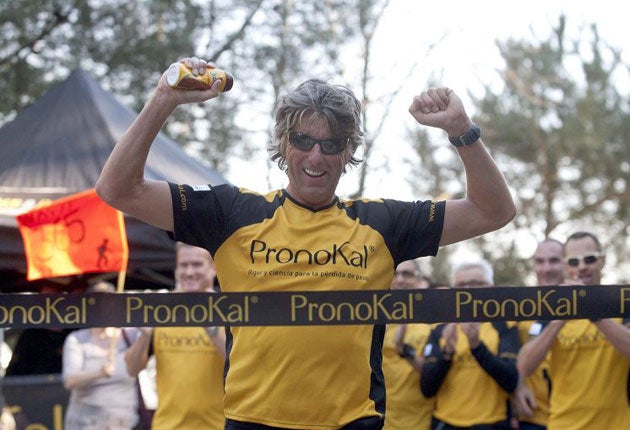Belgian enters the record books with 365 marathons in a year

Stefaan Engels adds new meaning to the word "globetrotter". The 49-year-old Belgian athlete, known as Marathon Man, has completed 365 races in a year, speeding through seven countries at the staggering rate of one 42km marathon a day.
At the weekend, he set a Guinness world record for consecutive marathons as he crossed the finish line in the Spanish city of Barcelona. He set out on 5 February last year from his hometown of Ghent and emerged more than 15,000km later at Saturday's Carretera de les Aigües race, pumping his fit, tanned arms and flashing a toothy smile beneath a shock of silver hair.
"It's been a very, very long year," he told the Spanish news agency Efe after the final stretch. Along the way, the former designer and sports promoter lost 15kg (33lb), destroyed 25 pairs of trainers and drew thousands of supportive runners to his side. His average time: four hours per marathon at the "slow" pace of 10km per hour. His best finish was 2 hours and 56 minutes. Exhausted just thinking about it? It wasn't so hard after all, he says.
"I don't regard my marathon year as torture. It's more like a regular job," he says on his website, which displays photos of the taut middle-aged man jogging along the beach in the Costa del Sol resort of Malaga. "I am running just as Joe Average goes to work on Monday morning, whether or not he feels like it. I don't always feel like running, but when I am done, I take a shower, have some physiotherapy for an hour, and that wraps up my day."
Engel ended his tour with races through 11 Spanish cities, from Madrid to Majorca. His itinerary included stops in the US, England, Portugal, Canada and Mexico, where he suffered from altitude adjustment and indigestion. "I was at 2,000ft above sea level and after two days, I couldn't eat," he recalled. "After surviving Mexico, nothing could touch me."
For energy, he feasted on pasta – or paella when in Spain – meat, fish and a little wine. "At first the doctors said you have to take vitamin supplements and follow a certain diet, but I just ate whatever I wanted," he told The Independent. He also slept up to 12 hours a night; his sole medicine: a daily aspirin.
Engels attributes his endurance to a quick recovery rate and a slow heart beat. "Many people get more stressed talking to their boss than I do running," he said. His 25 years of training also helped. In 2008, he set a world record for triathlons with 20 Iron Man races in 12 months. The key was determination. "It is more a mental story," he said. "The problem was thinking about running a marathon every day. I just told myself to run that day and did not think about the next day or next week."
Engels embarked on his quest to encourage others to achieve seemingly unattainable goals. "I also wanted to inspire people by showing that if I could run a marathon a day for an entire year, that anyone could run or bike a little each day or do something about their weight problem," he said.
Marathon Man began running in defiance of doctors' orders: he was told to avoid sports as a child because he suffers from asthma. When he is not panting past the orange groves in Murcia, he gives inspirational lectures. His book, MarathonMan365, is to be published in April in time for his 50th birthday. He will probably rest until then. "I don't think I'll take more risks with my body," he said. "It's tired."
Lighter on your feet
* As a way to lose weight, it is unbeatable. Stefaan Engels' 15kg weight loss, achieved despite the vast quantities of calories he will have been consuming each day, is testimony to that. A study of competitors in the 2009 TransEurope Foot Race, which followed a 2,800-mile course from Italy to Norway, found they lost 40 per cent of their body fat, most of it during the first half of the race. Despite the daily exercise, the athletes' leg muscles degenerated because of the immense energy consumption.
The most persistent criticism of running is that it damages the joints. In fact, although it is a high-impact exercise, people who run regularly have less pain and less arthritis than non-runners when they get older. However, the benefit is greatest for moderate runners – up to 20 miles a week. Engels may find his successive marathons leave a legacy he will feel for decades to come. JEREMY LAURANCE, HEALTH EDITOR
Join our commenting forum
Join thought-provoking conversations, follow other Independent readers and see their replies
Comments
Bookmark popover
Removed from bookmarks